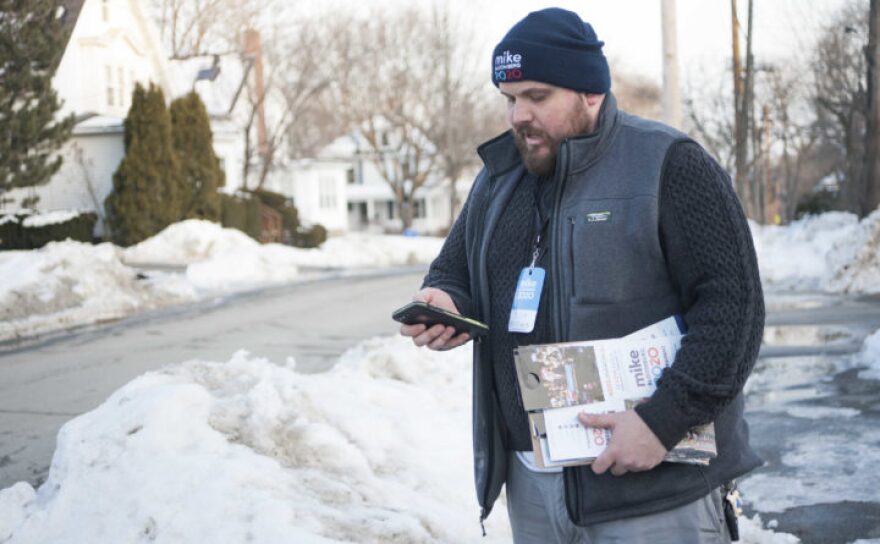Volunteers knocking on doors for Democratic presidential hopefuls in Maine say climate change and health care are the most pressing issues ahead of the March 3 primary. But there’s another priority — finding the person most likely to beat President Donald Trump.Four candidates — Vermont Sen. Bernie Sanders, Massachusetts Sen. Elizabeth Warren, former New York City Mayor Mike Bloomberg and former Mayor Pete Buttigieg of South Bend, Indiana — have significant ground operations in Maine. Some have had volunteers on the ground since last spring. Others have brought staff into the state in the past few weeks.
As campaigns ramp up the fight for Maine’s 24 pledged delegates, organizers say opposition to Trump has driven enthusiasm among many voters who had not been as involved in party politics in past election cycles. But fear about the president’s potential to win another term also makes each candidate’s so-called “electability” a leading issue for Democratic voters.
“Everyone wants to beat Trump,” said Leah Knightly of Bangor, who has been volunteering with the Sanders campaign since the Vermont senator announced his 2020 presidential run last March. “When I think about it, that’s probably the biggest issue.”
But few primary voters seem to be sure about which candidate might be best suited to face off with the president in a general election, giving each campaign the opportunity to make its case.
“That can be a hard mindset to talk with because it’s unknowable,” said Meghan Kelly of Portland, a Warren volunteer.
Kelly, who said she was drawn to Warren by her stance on climate change and work on the Consumer Financial Protection Bureau, pointed to the senator’s sharp questioning of Bloomberg in a Las Vegas debate last week as evidence of her ability to take on Trump.

Ryan Orlando of Fryeburg, a Buttigieg volunteer who had supported Republicans for most of his life but voted for Libertarian Gary Johnson in 2016, said the former mayor had the most appeal in part because of his ability to bring in “people in the middle like me.”
Sanders, who is the party’s front-runner after winning the highest vote totals in the first three states to hold nominating races, has argued he can best activate new voters and appeal to the working class behind a progressive platform. Former Vice President Joe Biden and Minnesota Sen. Amy Klobuchar have cited policy experience and ability to appeal to moderate voters.
Although the question of who can beat Trump remains unanswered, several organizers said that resistance to the president was spurring more engagement among Democratic voters, citing the number of volunteers who were canvassing or phone-banking for the first time.
Beating Trump is far from the only issue voters say they care about. Organizers for every campaign said health care and climate change were the two policy issues that came up most frequently, with some voters citing expensive medical bills or concerns about creating a safer planet for future generations as reasons that they planned to vote Democratic.

Megan Smith of Milford, a Sanders volunteer, said she was drawn to the Vermont senator in 2016 because of his support for universal health care, citing an experience when her insurance declined to cover care for her daughter. She said when she shared her story while canvassing, she would often hear from other voters about their own troubles with health insurance.
The Vermont senator, who won the Maine caucuses in 2016, is the favorite to win here again after leading a poll released by Colby College last week. Maine is one of more than a dozen states voting on March 3. Smith said supporters she talked to were “cautiously optimistic” about his prospects in Maine, but that wouldn’t change their strategy in the coming week.
“We like to operate like we’re 10 points behind in every race,” Smith said. “You’ve got to keep knocking on doors, you’ve got to keep making calls.”
Isabel Clarke of Cape Elizabeth, an organizer for the Bloomberg campaign, said she finds plenty of undecided voters with just over a week to go until the primary, a sentiment several volunteers for other campaigns agreed with. But Clarke also noticed that even voters who have decided on a candidate had something in common.
“They say no matter who the nominee is, they’ll vote Democratic,” she said.
Early voting for the presidential primary is already open. Only registered Democrats can vote in the primary, but unenrolled voters are allowed to register at the polls through Election Day. The Republican primary will also take place on March 3, though Trump is unopposed on the ballot.
This story appears through a media sharing agreement with Bangor Daily News.


